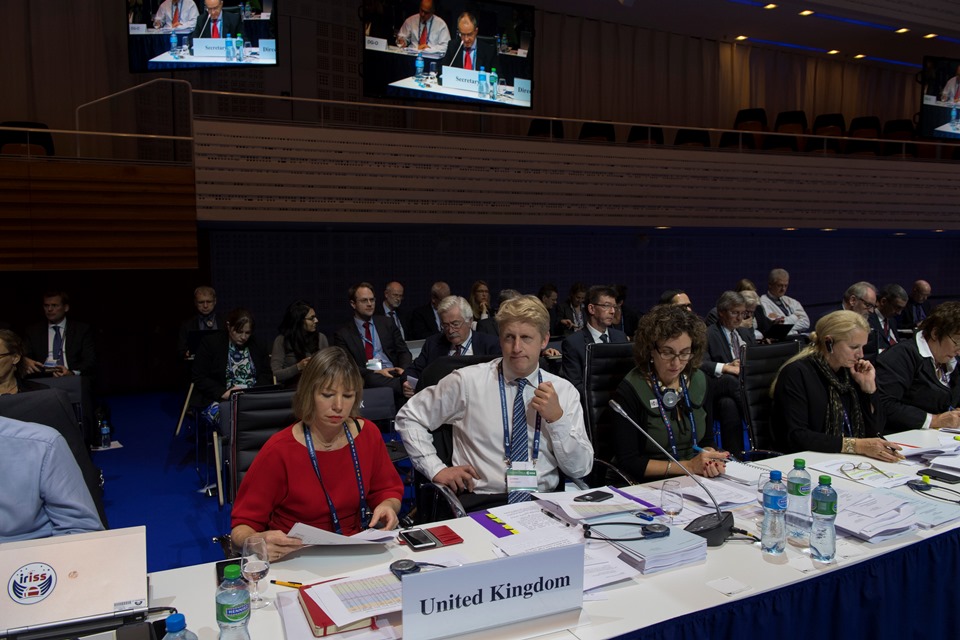Speech from Science Minister Jo Johnson at the ESA Ministerial
Opening statement from Minister of State for Universities, Science, Research & Innovation, Jo Johnson at the ESA Ministerial Council 2016.

Good morning, my fellow Ministers, Director General, Colleagues from around Europe, and observers from our partners around the globe.
My special thanks to the Presidency of Switzerland for their sustained and committed work in preparing for this meeting.
Two years ago, at the last Council at Ministerial level in Luxembourg, our now Secretary of State Greg Clark affirmed the UK’s continued commitment to ESA. The funding committed at that meeting has already started to return real benefits for UK industry and our world-class scientific community.
As the DG has recognized with his Space 4.0 vision, the global space environment is changing. And our relationship with Europe is changing at the same time.
There may still be unanswered questions to address over the coming months and years - but let me be clear on at least one point today:
The UK remains committed to collaboration with our European partners on space.
We continue to recognize the value of European cooperation on fundamental science, innovative technology, and daring space exploration through the European Space Agency.
We see the value of our membership in ESA – for every pound invested, we see a return of £10 back to the wider UK economy. Our space sector is worth over £11.8bn for the UK economy, and employs at least 37,000 staff around the country.
I have come to the table today with the intention to sustain our investment across the spread of programmes here in ESA. We recognise the power of space to bring out the best of Britain and as an example of our strong international partnerships.
This has been evident in key science programmes over the last year, particularly with Tim Peake’s Principia mission to the ISS. His mission has captivated the whole of the UK as well as the wider international audience, and strengthened the case for microgravity science in orbit.
The successful delivery of the ExoMars programme is our next major priority for the UK. Agency staff have regularly updated me on the complicated picture of the programme, and I should congratulate our colleagues at ESA on the successful first part of the mission. I look to colleagues around the table to help put our European rover on the surface of Mars.
Of course, the UK’s continued focus is also on strengthening the partnerships and capability of our UK space industry. Over the next two days, I intend to commit to a strengthened UK presence in telecommunications, fundamental technology, and commercial services involving space data and applications.
It important that we continue UK leadership on ESA’s telecommunications programme, including new projects in partnership with industry and investment in key technologies.
ESA’s Earth Observation programme is also a priority - cementing the UK’s position as a leader in scientific and industrial activities across Europe and securing world-class science, jobs and economic growth in the UK for years to come.
We intend to lead the ESA navigation programme, with a focus on services from space which we believe could capture a share of a new market worth up to €30bn across Europe.
I believe that strong commercial partnerships can strengthen our world-leading space science and that fostering our remarkable industrial capability will mean that ESA continues to play a role in the future of space.
We anticipate the ESA centre at Harwell will grow to become a major centre not just for telecommunications but for all commercial services and applications involving space data. These applications range from climate monitoring to services based on navigation which are currently as diverse as prisoner tagging or catching Pokémon!
We also welcome the DG’s approach to reshaping ESA, continuing its evolution, efficiency and reform agenda to meet the challenges set out in Space 4.0.
Just as continued national investment in space must return real value for our industries, scientists and general public, so too must ESA.
In summary, my priorities at this Council of Ministers are:
- reaffirming our commitment to European cooperation on science programmes
- strong commercial investments in telecommunications, navigation and earth observation technology
- securing the future of the next phase of ExoMars
The UK remains at the table, ready to contribute to the success of this meeting and this organisation.